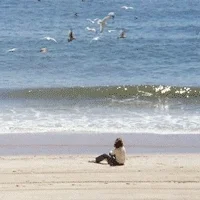Non-lethal
impacts of seabirds' plastic ingestion
University of Tasmania
 An IMAS-led study of
seabirds that had ingested plastic debris has revealed a range of non-lethal
impacts on their health and physiology.
An IMAS-led study of
seabirds that had ingested plastic debris has revealed a range of non-lethal
impacts on their health and physiology.
While seabird deaths
due to swallowing plastic debris or becoming entangled in it have received
global attention, the non-lethal effects on seabirds that survive plastic
ingestion are less well-known.
The study led by IMAS' Dr Jennifer Lavers and published in the journal Environmental Science & Technology has found that plastic ingestion can have a significant negative impact even on superficially healthy seabirds.
The research, which
included scientists from Lord Howe Island Museum and the UK's Natural History
Museum, analysed blood and plastic samples collected from Flesh-footed
Shearwaters on Lord Howe Island.
"Flesh-footed Shearwaters populations are declining across the south west Pacific Ocean and Western Australia's south coast," Dr Lavers said.
"Plastic
ingestion has been implicated in this decline but the mechanisms by which it
affects shearwaters are poorly understood.
"Our study found
that birds which ingested plastic had reduced blood calcium levels, body mass,
wing length, and head and bill length.
"The presence of
plastic also had a negative impact on the birds' kidney function, causing a
higher concentration of uric acid, as well as on their cholesterol and
enzymes."
Dr Lavers said the
study found that the simple presence of plastic was enough to cause negative
consequences, regardless of the amount.
"Our data did not
show a significant relationship between the volume of plastic ingested and the
health of individuals, suggesting that any plastic ingestion is sufficient to
have an impact.
"Until now there
has been scant information on the blood composition of seabirds in the wild,
many of which have been identified as threatened species.
"Understanding
how individual seabirds are affected is also further complicated by the fact
they spend little time on land or at breeding colonies, and most mortalities
occur at sea where the causes of death are often unknown.
"The complex
range of issues that face seabirds -- from habitat loss and climate change to
fishing and marine pollution -- make it vital that we better understand the
impact of particular challenges such as plastic debris," Dr Lavers said.
The research was
supported by Detached Foundation and Living Ocean Foundation.